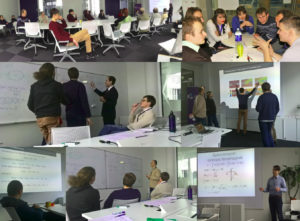 For the past two decades density functional theory (DFT) has been revolutionizing chemistry and materials science. In 2016 alone more than 50 000 scientific papers were published that used DFT and valid predictions are becoming commonplace. For example, based on DFT predictions, materials scientists have developed the first-ever growth of 2D GaN (August 2016). European Physical Society Young Minds Section of Vilnius University (EPS YM Vilnius) together with Electronic Structure Theory Group from Center for Physical Sciences and Technology (CPST) launched “Modern density functional theory – from physics to coding” workshops at the CPST. These workshops introduced advances of DFT theory and its applications to all students interested in computational material or experimental science. The aim was to share necessary theoretical knowledge and experience on applications of DFT to popularize computational physics among the students. Such methods are widely used from biophysics to materials science and are a driving force for the discovery and design of molecules and materials. Workshops were given by members of Electronic Structure Theory Group (dr. A. Alkauskas) and lecturers from Institute of Theoretical Physics and Astronomy (prof. G. Juzeliūnas). In particular, the practical usages of some DFT codes, such that one can carry out the computation associated with their research projects after reading the manuals. Students were asked to choose one topic, read references and partake in discussions with group members. Students worked on assignments and literature in an interactive and collaborative manner, got practical problem solving exercises. EPS in Vilnius has purchased 2 books for these seminars “Symmetry in Physics: Principles and Simple Applications Volume 1 & Volume 2″ (by James Philip Elliott, P.G. Dawber).
For the past two decades density functional theory (DFT) has been revolutionizing chemistry and materials science. In 2016 alone more than 50 000 scientific papers were published that used DFT and valid predictions are becoming commonplace. For example, based on DFT predictions, materials scientists have developed the first-ever growth of 2D GaN (August 2016). European Physical Society Young Minds Section of Vilnius University (EPS YM Vilnius) together with Electronic Structure Theory Group from Center for Physical Sciences and Technology (CPST) launched “Modern density functional theory – from physics to coding” workshops at the CPST. These workshops introduced advances of DFT theory and its applications to all students interested in computational material or experimental science. The aim was to share necessary theoretical knowledge and experience on applications of DFT to popularize computational physics among the students. Such methods are widely used from biophysics to materials science and are a driving force for the discovery and design of molecules and materials. Workshops were given by members of Electronic Structure Theory Group (dr. A. Alkauskas) and lecturers from Institute of Theoretical Physics and Astronomy (prof. G. Juzeliūnas). In particular, the practical usages of some DFT codes, such that one can carry out the computation associated with their research projects after reading the manuals. Students were asked to choose one topic, read references and partake in discussions with group members. Students worked on assignments and literature in an interactive and collaborative manner, got practical problem solving exercises. EPS in Vilnius has purchased 2 books for these seminars “Symmetry in Physics: Principles and Simple Applications Volume 1 & Volume 2″ (by James Philip Elliott, P.G. Dawber).
